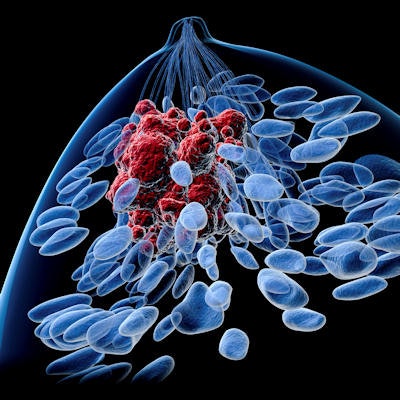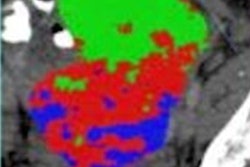
Using a deep-learning algorithm with contrast-enhanced CT data is an effective way to predict axillary lymph node metastasis in breast cancer patients, according to a study published August 5 in Computers in Biology and Medicine.
The study findings could translate to even better care and treatment for women with breast cancer, wrote a team led by Dr. Ziyi Liu of Southwest Jiaotong University in Chengdu, China.
"The metastatic axillary lymph nodes that may exist in breast cancer patients [are] a great impact factor not only for prognosis but also for making treatment decisions," the group wrote.
Breast cancer is the leading cause of cancer-related death in women, and the main cause of mortality is from metastasis, the team noted. Identifying axillary lymph node metastasis is crucial for staging treatment, and women may undergo preoperative mammography, ultrasound, or breast MRI for this purpose. But CT is also useful and, although it imparts higher levels of radiation, has a shorter scan time and fewer contraindications than, say, MRI. Additionally, CT can not only visualize tumor tissue and axillary lymph nodes but it can also rule out intrapulmonary and bone metastases, the researchers wrote.
And imaging is a less invasive way to characterize axillary lymph node metastasis than biopsy, according to Liu and colleagues.
"In the traditional diagnosis methods of breast cancer, axillary lymph node dissection for confirmation of axillary enlargement and sentinel node biopsy for confirmation of negative axillary patients are considered to be the accepted standard procedures for axillary lymph node staging," they wrote. "[But dissection and biopsy] are both invasive, and there are still some unacceptable complications ... Hence, a series of accurate and noninvasive methods for predicting the axillary lymph node status before surgery has been proposed ... [including imaging]."
Since clinicians' performance reading contrast-enhanced CT images for assessing axillary lymph node metastasis can vary -- influenced as it is by their own experience and level of fatigue -- the investigators explored whether deep learning could aid in the task. They developed a deformable sampling module algorithm called deformable attention VGG19 (DA-VGG19) and used 800 contrast-enhanced CT images from 401 breast cancer patients to train, validate, and test the model; they assessed its accuracy, positive predictive value, negative predictive value, sensitivity, and specificity.
| Performance of deep-learning algorithm for predicting metastasis of axillary lymph nodes in breast cancer patients | |
| Measure | DA-VGG19 |
| Accuracy | 91% |
| Positive predictive value | 88% |
| Negative predictive value | 95% |
| Sensitivity | 95% |
| Specificity | 87% |
The algorithm shows promise for providing clinicians with "daily diagnostic assistance and advice and [reducing their] workload," according to the authors.
"In future studies, we plan to conduct a multicenter study to further validate the robustness and reproducibility of the model and extend the research on axillary lymph nodes to a three-dimensional level," they concluded.



















